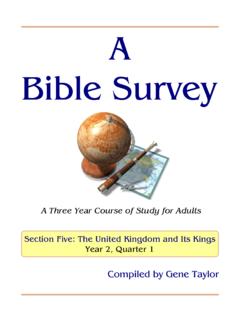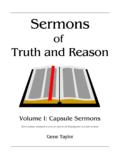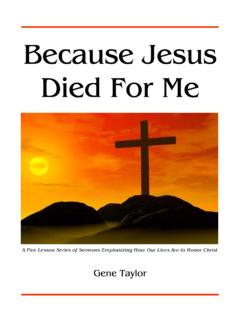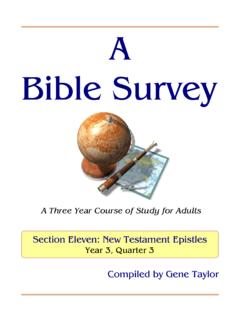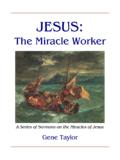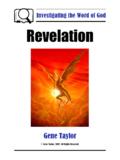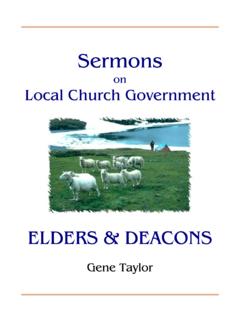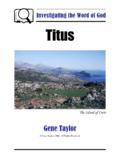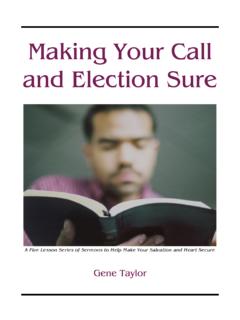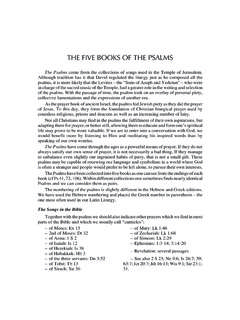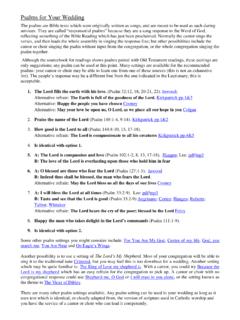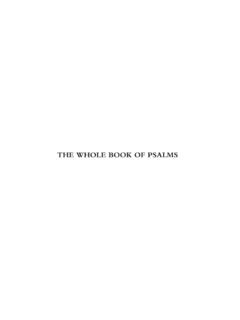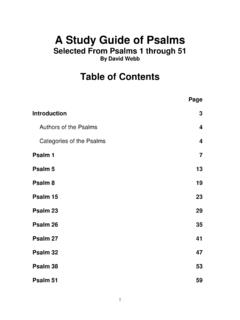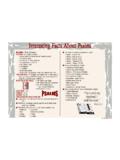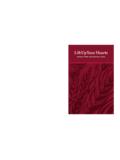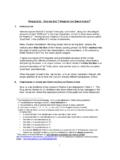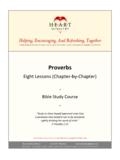Transcription of Studying The Psalms - Centerville Road | Gene …
1 Studying the Psalms An Introduction to the Psalms Compiled by Gene Taylor An Introduction to the Psalms Studying the Psalms Table of Contents The Book of Psalms : An Introduction 2. Lesson One: Psalms of Praise 10. Lesson Two: Psalms of Guidance 11. Lesson Three: Messianic Psalms 12. Lesson Four: Instructional Psalms 14. Lesson Five: Psalms of Nature 16. Lesson Six: Psalms of Repentance 17. Copyright 2014. All Rights Reserved -1- Studying the Psalms An Introduction to the Psalms The Book of Psalms I. The Nature of the Book of Psalms A. The name. 1. Psalms is from the Greek title denoting songs adapted to music on stringed instruments. Its title in the original Hebrew simply meant praises, denoting the general theme of the Psalms . 2. In Hebrew this book was called Praises,' Book of Praises,' or Prayers.' Later it became known as the Book of Psalms .' In the New Testament it is called by this name by our Lord (Luke 24:44), by Paul (Acts 13:38), and by Luke (Luke 20:42)This name was used by those who produced the Septuagint Version of the Old (William S.)
2 Deal, Baker's Pictorial Introduction to the Bible, 143). 3. The book of Psalms was gradually collected and came to be known as the Sepher Tehillim ( Book of Praises'), because almost every psalm contains some note of praise to God. The Septuagint (Greek Old Testament) uses this Greek term Psalmoi as a title for this book, meaning poems sung to the accompaniment of musical instruments, and this word is the basis for the English terms psalter'. and psalm' (Nelson's Complete Book of Bible Maps & Charts, 175). B. The character of the book. 1. The book of Psalms is the largest and perhaps the most widely used book in the Bible. It explores the full range of human experiences in a very personal and practical way. Written over a lengthy period of Israel's history, the tremendous breadth of subject matter in the Psalms includes topics such as jubilation, war, peace, worship, judgment, messianic prophecy, praise, and lament.
3 The Psalms were set to the accompaniment of stringed instruments and served as the temple hymnbook and devotional guide for the Jewish The Psalms were originally individual poems. With the passing of time these were collected to form smaller books and the book of Psalms in its present form comprises five of these smaller books (Nelson's, ibid.). 2. The Psalms are mostly lyrical poetry, that is, poetry adapted to the harp or lyre;. to be used in connection with instrumental music; to be sung not poetry is, for the most part, an expression of deep feeling, and has its foundation in feeling or authors of that poetry were inspired to prepare and transmit to future times that which, in all ages, would express the feelings of true devotion, and which might be permanently employed in the praises of God (Albert Barnes, Barnes Notes on the Old Testament, Psalms Vol.)
4 I, xix-xxi). 3. While most of the Bible is God's voice calling to His creatures, the book of Psalms is mankind's voice raised to the Lord. As the various writers expressed their personal feelings, desires, and needs, the Spirit of God led them to strike the chords of sensitive hearts universally (Rubel Shelly, A Book-by-Book Study of the Old Testament, 78). -2- An Introduction to the Psalms Studying the Psalms a. Someone has suggested the five books of the Psalms are really a tribute to the five books of Moses (Genesis - Deuteronomy), the Pentateuch. The law is the five-fold book of God to His people while the Psalms respond by being the five-fold book of the people to God. 1) Book 1 (Psa. 1-41). Corresponds with Genesis having much to say about man. 2) Book 2 (Psa. 42-72). Corresponds with Exodus having much to say about redemption. 3) Book 3 (Psa.
5 73-89). Corresponds with Leviticus and emphasizes worship. 4) Book 4 (Psa. 90-106). Begins with the psalm of Moses and corres- ponds with Numbers stressing wandering. 5) Book 5 (Psa. 107-150). Corresponds with Deuteronomy and offers thanksgiving for the Divine faithfulness with emphasis on the the word of God. Psalm 119, the longest of all the Psalms , has as its theme the word of the Lord.. b. Perhaps the central thought of this book of praise is 95:6-7. O come, let us worship and bow down: let us kneel before the Lord our Maker. For He is our God; and we are the people of His pasture, and the sheep of His hand' (Johnny Ramsey, The Book of Psalms , 3). 4. Through the ages, man has found in poetry a means of expressing the deepest, most profound, and intensive feelings of the human heart. In the Psalms the Hebrew poets expressed these emotions for themselves and for the we read them we find that they expressed them for ourselves as the Psalms one finds expressed the eager yearning and longing for God's presence; prayers and songs of joyous trust and praise; cries of burning complaints and bitterness against and toward enemies; times of doubt and despair; yet throughout all experiences which produced these emotions, there is dependance on God.
6 To appreciate the Psalms , one must enter into and share the spirit of the Psalmist (Homer Hailey, Bible Class Notes - The Psalms , 1). II. The Author A. The book of Psalms is a compilation of the songs of various Hebrew authors including, according to the superscriptions heading many of the Psalms , Moses (90), Asaph (50, 73- 83), Sons of Korah (42; 44-49; 84-85; 87-88), Heman the Ezrahite (88), Ethan the Ezra-hite (89), Solomon (72; 127), and David (writer of at least 73 of the Psalms ) while the rest are anonymous. B. The book is commonly referred to as belonging to David because he wrote about half of the Psalms . 1. The headings attribute 73 to him but he probably wrote more (cf. Psalm 2 with Acts 4:25-26 and Psalms 105 and 96 with 1 Chron. 16:7-36). 2. He is known as the sweet psalmist of Israel (2 Sam. 23:1; cf. also 1 Sam. 16:18; 2. Sam. 6:5,15; 2 Chron.)
7 7:6; 29:25; Amos 6:5). -3- Studying the Psalms An Introduction to the Psalms 3. He arranged the temple song service (1 Chron. 25) and also commissioned men including Asaph, Ethan, Heman and Jeduthun, to compose songs for the temple worship (1 Chron. 15:19; 16:4-6; 25:1; cf. Kings 4:31; 1 Chron. 2:6; 26:1). C. No other book of the Bible has as many different authors as does Psalms . Seventy-three Psalms are attributed to David in the superscriptions, and an additional two, Psalms 2 and 95, are ascribed to David in the New Testament. In addition to the seventy-five by David, twelve are ascribed to Asaph, a priest who headed the service of music. Ten were by the sons of Korah, a guild of singers and composers, and other Psalms are ascribed to Solomon, Moses, Heman the Ezrahite and Ethan the Ezrahite, Fifty of the Psalms are anonymous, although some of these are traditionally ascribed to Ezra (Nelson's, 175).
8 III. The Date A. The Psalms were written over a long period of time, perhaps 600 years (The Shaw Pocket Bible Handbook, 196). B. The time covered by Psalms is a long span. They reach from the days of Moses in the wilderness to the days of the prophets Haggai and Zechariah. While the range of writing extends over many hundreds of years, it is remarkable how little variation there is in the general expressions of the writers and the truths they taught (Deal, 143). C. The earliest individual psalm is probably that of Moses (Ps. 90); the latest is probably Psalm 137, which could not have been written before the sixth century B .C . Though many of the Psalms were written and collected during the Davidic era, or shortly thereafter, the final compilation of Psalms was probably not complete until the latter half of the fifth century B .C . during the time of Ezra and Nehemiah (450-425 B.)
9 C .) (Nelson's, 175, 177). IV. Characteristics of the Book of Psalms A. Five divisions. The book of Psalms is a collection of five smaller books of songs each of which ends with a doxology a hymn of praise to God. 1. The divisions are as follows: a. Book I: Psalms 1-41. b. Book II: Psalms 42-72. c. Book III: Psalms 73-89. d. Book IV: Psalms 90-106. e. Book V: Psalms 107-150. 2. The book is divided in the Hebrew into five minor books or collections, suffici- ently marked in their character, and so indicated at the close of each as to make it every way probable that these may have been published, so to speak, in the form of different books, or that the latter were additions to the first collection or volume (Barnes, xiii-xiv). 3. G. Campbell Morgan believes the key to the content of each division or book is found in the closing doxologies and an examination of these will reveal a certain conception of God, and an attitude of the soul in worship resulting from such a conception (Notes on the Psalms , 9-10).
10 -4- An Introduction to the Psalms Studying the Psalms B. Psalm headings. 1. Many of the Psalms have superscriptions before the actual poetry which have generated much debate over their origin and authenticity. 2. Although not inspired, they are undoubtedly of ancient origin because they were in existence when the Septuagint (Greek) Version of the Old Testament was translated (280-180 B .C .). By that time many of the words concerning the musical score and musical instruments were unknown, implying a much earlier source. 3. These headings indicate: a. Authorship. b. Occasion of the psalm (cf. 34; 51; 52; etc.). c. Their intended use (cf. 30; 92; etc.). d. The type of psalm a prayer, meditation, etc. (cf. 32; 42-45; etc.). e. Musical instructions. 1) To the choir director. 2) The tune to which the psalm was to be played (cf. 22; 56-57 ; etc.). 3) The musical instruments to use in accompaniment (cf.
